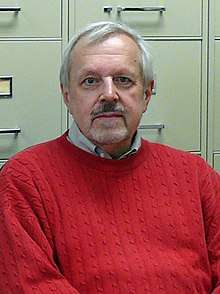Donald Truhlar
Donald G. Truhlar is an American scientist working in theoretical and computational chemistry and chemical physics with special emphases on quantum mechanics and chemical dynamics.[1]
Donald G. Truhlar | |
|---|---|
 Professor Don Truhlar, in his office | |
| Born | February 27, 1944 (age 76) Chicago, Illinois United States |
| Nationality | American |
| Alma mater | California Institute of Technology |
| Known for | Density Functional Theory, solvation models, Basis sets, quantum chemical methods |
| Awards | ACS Award in Theoretical Chemistry (2019) |
| Scientific career | |
| Fields | Computational Chemistry, Theoretical Chemistry, Quantum Chemistry |
| Institutions | University of Minnesota |
| Doctoral advisor | Aron Kuppermann |
Education and early work
Truhlar received a B.A., from St. Mary's College of Minnesota (1965), and a Ph. D., from Caltech (1970), under Aron Kuppermann.[2] He has been on the faculty of the University of Minnesota from 1969–present.
Important Contributions
Truhlar is known for his contributions[3] to theoretical chemical dynamics of chemical reactions; quantum mechanical scattering theory of chemical reactions and molecular energy transfer; electron scattering; theoretical kinetics and chemical dynamics; potential energy surfaces and molecular interactions; path integrals; variational transition state theory; the use of electronic structure theory for calculations of chemical structure, reaction rates, electronically nonadiabatic processes, and solvation effects; photochemistry; combustion chemistry; heterogeneous, homogeneous, and enzyme catalysis; atmospheric and environmental chemistry; drug design; nanoparticle structure and energetics; and density functional theory, including the Minnesota Functionals. He has been the author of more than 1200 papers published in journals of international repute. As of 2020, with an h-index of 175, one of his papers (in which the M06 density functional methods were described) had received more than 17,500 citations and his total body of work had been cited over 175,000 times.[4]
Awards and honors
Truhlar was elected to the International Academy of Quantum Molecular Science (2006), the National Academy of Sciences of the USA (2009), and the American Academy of Arts and Sciences (2015). He became an Honorary Fellow of the Chinese Chemical Society in 2015. He was named a Fellow of the American Association for the Advancement of Science, (1986) the American Chemical Society (2009), the American Physical Society (1986), the Royal Society of Chemistry (2009), and the World Association of Theoretical and Computational Chemists (2006). He was a visiting Fellow at the Battelle Memorial Institute (1973) and at the Joint Institute for Laboratory Astrophysics (1975–76), and was named an Alfred P. Sloan Foundation Research Fellow (1973).
He received the NSF Creativity Award (1993), the ACS Award for Computers in Chemical and Pharmaceutical Research (2000), the Minnesota Award (2003) ("for outstanding contributions to the chemical sciences"), the National Academy of Sciences Award for Scientific Reviewing (2004); the ACS Peter Debye Award for Physical Chemistry (2006), the Lise Meitner Lectureship Award (2006), the Schrödinger Medal of The World Association of Theoretical and Computational Chemists (2006), the Dudley R. Herschbach Award for Research in Molecular Collision Dynamics (2009), Doctor honoris causa of Technical University of Lodz, Poland, (2010), the Royal Society of Chemistry Chemical Dynamics Award (2012), the APS Earle K. Plyler Prize for Molecular Spectroscopy and Dynamics (2015), and the 2019 ACS Award in Theoretical Chemistry (2018).[5]
Truhlar has served as an Associate Editor of the Journal of the American Chemical Society (1984–2016), as (successively) editor, editor-in-chief, associate editor, and chief advisory editor of Theoretical Chemistry Accounts (formerly Theoretica Chimica Acta) (1985–present), and as a principal editor of Computer Physics Communications (1986–2015).[6]
References
- http://pubs.acs.org/toc/jpcafh/110/2 Journal of Physical Chemistry A Volume 110, Issue 2, 2006: Donald G. Truhlar Festschrift
- "Archived copy". Archived from the original on 2012-03-06. Retrieved 2012-03-12.CS1 maint: archived copy as title (link)
- "International Academy of Quantum Molecular Science".
- https://scholar.google.com/citations?user=1gaf87YAAAAJ
- "Professor Truhlar receives 2019 ACS Award in Theoretical Chemistry". Department of Chemistry. 2018-09-17. Retrieved 2018-09-24.
- "Curriculum Vitae of Donald G. Truhlar". The Journal of Physical Chemistry A. 110 (2): 359–360. 2006. Bibcode:2006JPCA..110..359.. doi:10.1021/jp055732y.